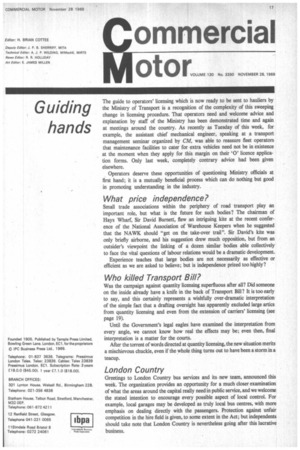Guiding hands
Page 19

If you've noticed an error in this article please click here to report it so we can fix it.
The guide to operators' licensing which is now ready to be sent to hauliers by the Ministry of Transport is a recognition of the complexity of this sweeping change in licensing procedure. That operators need and welcome advice and explanation by staff of the Ministry has been demonstrated time and again at meetings around the country. As recently as Tuesday of this week, for example, the assistant chief mechanical engineer, speaking at a transport management seminar organized by CM, was able to reassure fleet operators that maintenance facilities to cater for extra vehicles need not be in existence at the moment when they apply for this margin on their '0' licence application forms. Only last week, completely contrary advice had been given elsewhere.
Operators deserve these opportunities of questioning Ministry officials at first hand; it is a mutually beneficial process which can do nothing but good in promoting understanding in the industry.
What price independence?
Small trade associations within the periphery of road transport play an important role, but what is the future for such bodies? The chairman of Hays Wharf, Sir David Burnett, flew an intriguing kite at the recent conference of the National Association of Warehouse Keepers when he suggested that the NAWK should "get on the take-over trail". Sir David's kite was only briefly airborne, and his suggestion drew much opposition, but from an outsider's viewpoint the linking of a dozen similar bodies able collectively to face the vital questions of labour relations would be a dramatic development.
Experience teaches that large bodies are not necessarily as effective or efficient as we are asked to believe; but is independence prized too highly?
Who killed Transport Bill?
Was the campaign against quantity licensing superfluous after all? Did someone on the inside already have a knife in the back of Transport Bill? It is too early to say, and this certainly represents a wishfully over-dramatic interpretation of the simple fact that a drafting oversight has apparently excluded large artics from quantity licensing and even from the extension of carriers' licensing (see page 19).
Until the Government's legal eagles have examined the interpretation from every angle, we cannot know how real the effects may be; even then, final interpretation is a matter for the courts.
After the torrent of words directed at quantity licensing, the new situation merits a mischievous chuckle, even if the whole thing turns out to have been a storm in a teacup.
London Country
Greetings to London Country bus services and its new team, announced this week. The organization provides an opportunity for a much closer examination of what the areas around the capital really need in public service, and we welcome the stated intention to encourage every possible aspect of local control. For example, local garages may be developed as truly local bus centres, with more emphasis on dealing directly with the passengers. Protection against unfair competition in the hire field is given, to some extent in the Act; but independents should take note that London Country is nevertheless going after this lucrative business.
















































































































